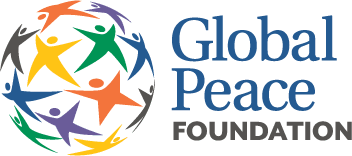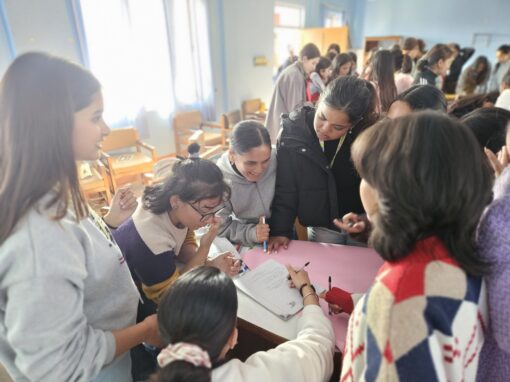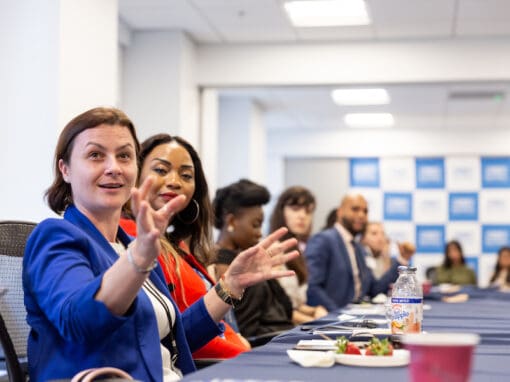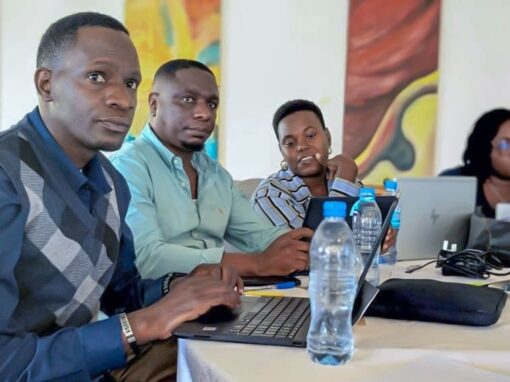February 27, BELFAST—The four-day Peace Learning Program culminated in an International Peace Forum hosted by Global Peace Foundation (GPF) in Northern Ireland under the theme, “Values-Based Peace Building: Practical and Evidence-Based.” The forum invited participants to engage with distinguished panelists, complimented with genuine discussions.
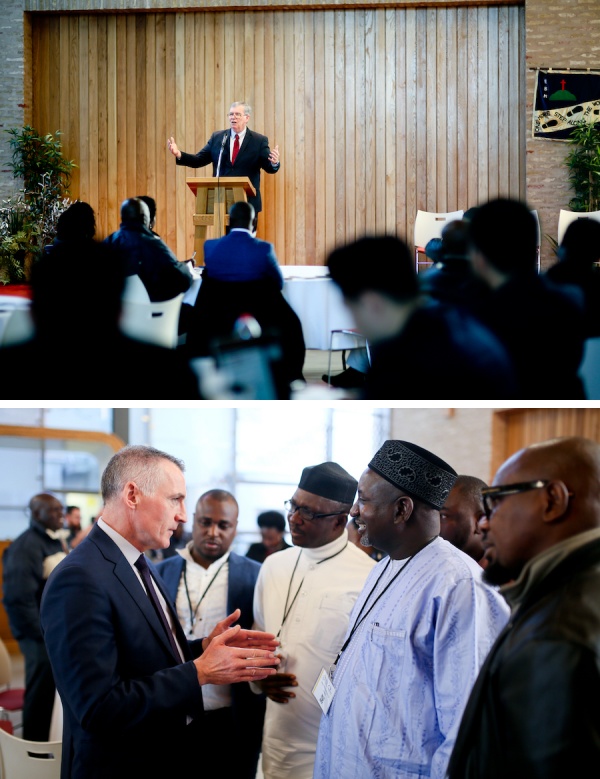
(Top) James Flynn addresses participants at the International Peace Forum in Belfast (Bottom) Declan Kearney (left) with Nigeria delegation at Belfast forum /Photos by Paul Moane
James Flynn, GPF International President, welcomed the international delegation with an overview of the key factors of building peace under the vision of shared values even among very different groups of people. By focusing on the things that string us together rather than the things that pull us apart, we can foster inclusive communities and build off our shared values to create trust and engagement. Mr. Flynn highlighted that the element that every human has in common with one another is the essence of family. He went on, “We are all beings that come from one single creator; we are all members of one family under God. A self-evident truth that every human being—no matter what race, religion, tribe, nationality or socioeconomic status—every human being has fundamental human value instilled in them by their creator.”
Mr. Flynn continued by describing how tragedy can be a powerful catalyst to unite people. Nations that are experiencing conflict and natural disasters are also using the calamities as opportunities to bring people together to discover solutions. Using the case of the horrific earthquake that nearly demolished Haiti as an example, Mr. Flynn shared the story of Kiki, a small boy, who was trapped under rubble for days, but the moment rescue staff heard his cries, they all rushed to save his life at all costs, catching the attention of people all over the world. The celebrations that followed the successful rescue of this boy was a perfect example of the value we all have for human life.
The Junior Minister of the Northern Ireland Executive Office, Declan Kearney, also attended the forum and expressed his gratitude to the delegates for coming to Belfast and taking the time to learn about the Irish Peace Process and how it can be applied in their nations. While the Junior Minister took some time to speak on the phenomenal progress Northern Ireland has experienced, he also noted how Ireland has so much more to complete in this journey of peace saying, “In the Irish context, our peace and political process must not be taken for granted. Old fault lines still remain.” Kearney made the point on how Northern Ireland is doing its best to bring holistic unity, from balancing a government that consists of multiple parties to researching and implementing new ways for community engagement with an emphasis on youth inclusivity. It’s clear that Northern Ireland is proud of how far it came but that it is far from putting the brakes on the country’s goal of achieving a peaceful community founded in trust and value.
Throughout the forum, distinguished panelist shared an enlightening series of presentations and discussions, including Imam Talib M. Shareef (President and Imam of the Masjid Muhammad), Zahed Amanullah (Resident Senior Fellow, Institute for Sustained Dialogue), Dr. Nilufar Choudry (Senior Advisor, Partnerships and Development, Global Peace Foundation). Dr. Choudry provided the delegation with an enriching presentation on building youth resilience to peace backed by several programs orchestrated by GPF in numerous countries. Those programs include a Peace Festival (Indonesia), Google Webrangers (Child Online Safety in Kenya), and a program on countering violent extremism (New Jersey, USA). Each of these programs involved thousands of stakeholders each ranging from students to first responders and each program provided data proving the effectiveness of these programs.
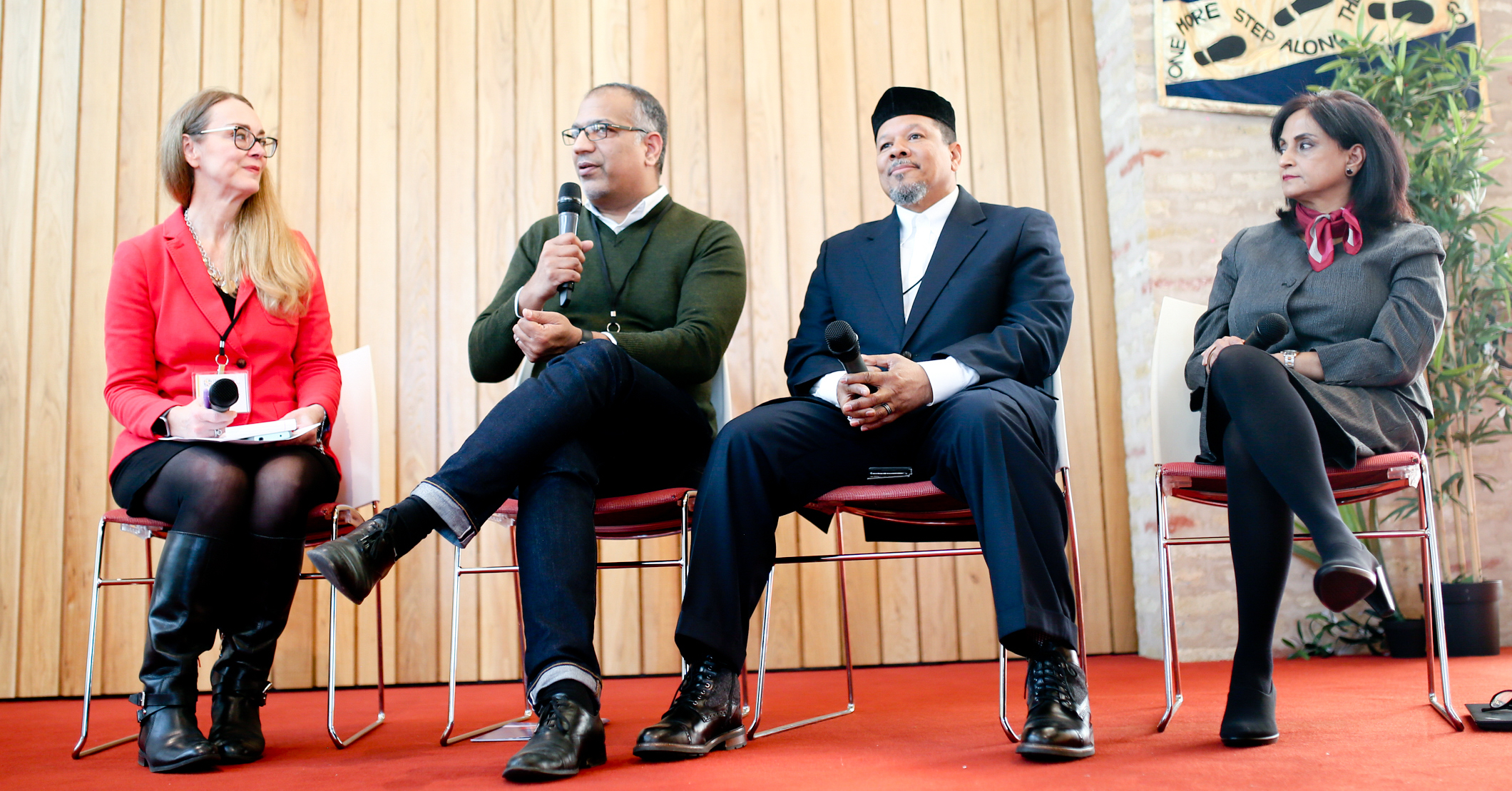
(From left) Cat Lockman, Zahed Amanullah, Imam Talib M. Shareef, and Dr. Nilufar Choudry speak at the International Peace Forum in Belfast, Northern Ireland /Photo by Paul Moane
Zahed Amanullah followed with a presentation on YouthCan (Youth Civil Activism Network) and how to Strengthen youth-led responses to hate and extremism. The program has curated a community of more than 1,500 young activists and has delivered numerous innovation labs for youth across the globe. Amanullah stressed the importance of having youth be the forerunners of peace activism and that communities play a supportive role in raising youth with the tools and knowledge to foster a stronger united future.
Imam Talib M. Shareef presented on similar topics that were covered in the two-day training leading up to the international forum. He once again emphasized the effectiveness of AMATE’s outreach campaign, highlighting how engaging a diverse number of stakeholders is essential to their outreach model.
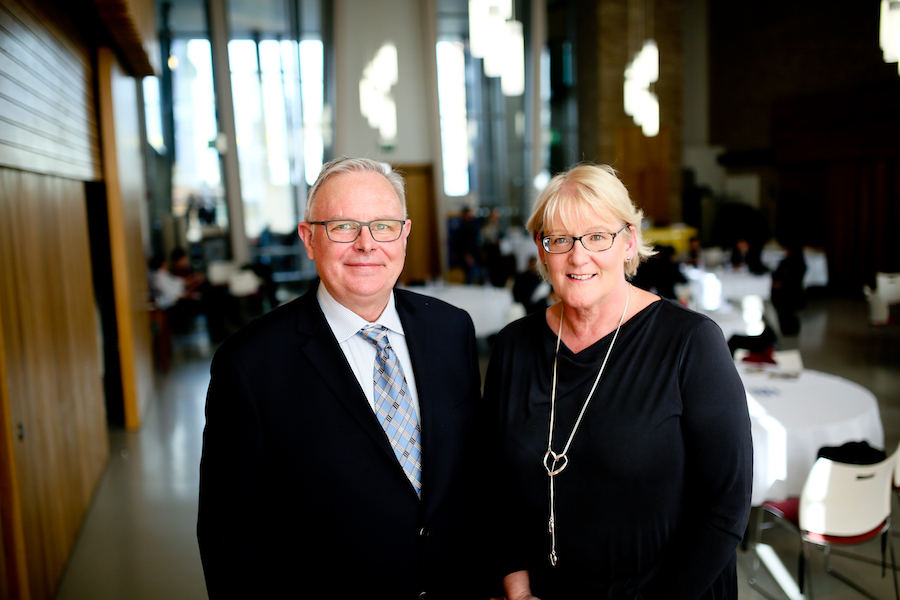
Dr. Tony Devine (left) and Dr. Suzanne Dillon (right) /Photo by Paul Moane
A networking lunch incorporated a fireside chat on the topic of: Tools to Promote and Cultivate Peaceful School Communities, facilitated by Dr. Suzanne Dillon (Chair, Advisory Group, OECD Future of Education & Skills 2030 Project) and Dr. Tony Devine (International Vice President, Education, Global Peace Foundation). In this discussion, delegates were exposed to the concept of the “Learning Compass,” which explores the required competencies to advance progress within school systems. Dr. Dillon described two categories of competencies: fundamental/core and transformational. The core competencies include knowledge, skills, and instilling positive attitudes and values in youth. These traits create a firm infrastructure among students where they can build and grow successfully. Dr. Dillon then introduced the transformative competencies which consist of creating new value, taking responsibility and reconciling tensions and dilemmas. “These transformative competencies construct strong moral compasses within students,” said Dr. Dillon as she went on to accent how critical it is to be actively engaging youth as partners of peace and education. She went deeper into the topic of attitudes and values and how they are scaled from four main categories: Personal, Local, Societal, and Global. Attitudes and values may differ depending on what scale is being operated in and each are interconnected factors that we must keep in mind when working for peace. As the discussion concluded, Dr. Dillion reminded everyone in the forum, “Before we can focus on helping others to achieve peace, we have to start with finding peace within ourselves.”
The final presentation proceeded with panelists Rev. Joseph John Hayab (Chairman, Christian Association of Nigeria Kaduna State, Nigeria), Sheik Halliru Abdulahi Maraya (Islamic Cleric and Former, Special Adviser to Kaduna State Governor on Muslim and Hajj matters), and Mark Clark (MBE CEO, Generations For Peace). Rev. Hayab and Sheik Maraya hosted similar discussions on their experience in bridging interfaith communities which led to peaceful resolutions.
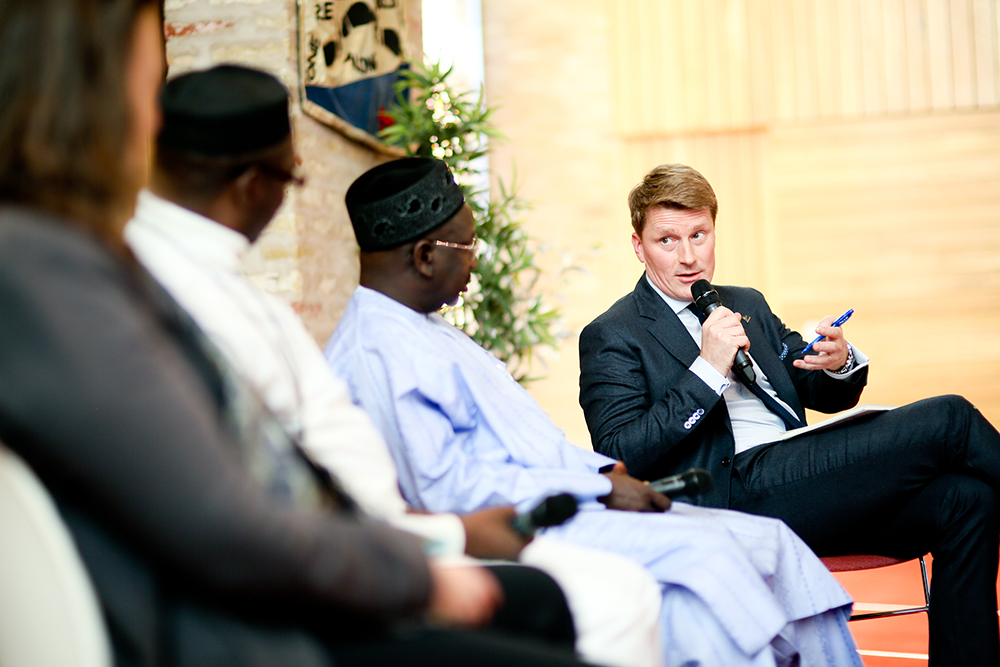
Panel on Conflict Resolution and Peacebuilding
Mr. Clark took the stage with an enlightening presentation on conflict resolution and peacebuilding. He made clear that conflict is not the equivalent to violence, but that conflict is a necessary aspect of life and it either produces violence or peace. He covered key aspects that play into peacebuilding: Personal capacities, relationships, structural norms, cultural narratives, and conflict dynamics. With these aspects in mind, Mr. Clark introduced the “CDE Model” which is an operative framework for peacemaking. CDE is an abbreviation where C stands for “a situation in time and space,” D is the differences in perspectives and identity, and E is the exchange which is defined by meetings, interactions, and transactions.
Mr. Clark went on to describe how essential three perspectives are when it comes to creating peace, tolerance, trust, and acceptance, including perspective-taking, perspective-making, and perspective-breaking. These perspectives are essential in understanding the stakeholders involved and erasing prejudice to create a new inclusive view of one another. Mr. Clark insisted that behavior change is a fruit of altercations in perspective and values, which are fostered by repeated engaging activity over a consistent time period. He emphasized that one-time events are not enough to cultivate peace; There needs to be training coupled with mentoring and support to bring lasting change.
Described as “vehicles of peace,” the categories of sports, arts, advocacy, dialogue, and empowerment can be key drivers for change and engagement. Mr. Clark went on to stress the importance of measuring progress saying, “If you’re not measuring it, you shouldn’t be doing it!” He shared ways to measure peace as well as the evidence of the impact that Generation for Peace has made in 27 countries: Measuring the reduction in violence, the increased capacity to manage conflict peacefully, the ability to break out of cycles of violence, changes in attitude and shattering of stereotypes, an increase in social capital, and engagement of key stakeholders such as women and youth.
The enlightening presentation highlighted the importance of working in the prevention of stage of conflict rather than the intervention stage. Many conflicts can be easily avoided with proper training and engagement before violent escalation. “Every dollar societies invest in preventing peace is equivalent to sixteen dollars used to stop violence,” said Mr. Clark.
The International Peace Forum was an appropriate conclusion to what delegates described as an “inspirational week full of treasures of information and insights.” The forum was an exemplary demonstration of what it means to engage the community while providing international leaders with enriching models of peacebuilding as they return to their nations with new tools, knowledge, and resources. As we spread awareness and have a genuine care for humanity in our hearts, we are that much closer to obtaining Global Peace.
